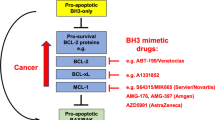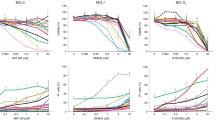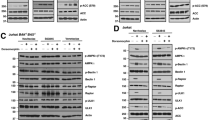Abstract
Bak has been shown to both promote apoptosis and to inhibit cell death while two other members of the Bcl-2 family of proteins, Bcl-XL and Bcl-2 delay apoptosis induced by various stimuli including chemotherapeutic agents. We generated clones with stable expression of Bak wild-type (wt) and Bak with its BH3 (Δ78-86) domain deleted (ΔBH3) in FL5.12 cells or FL5.12 cells expressing either Bcl-XL or Bcl-2 to determine if Bak could accelerate apoptosis and antagonize the death repressor activity of Bcl-XL and Bcl-2 during chemotherapy-induced apoptosis. We found that Bak accelerated cell death in FL5.12 cells treated with etoposide, fluorouracil or taxol. In FL5.12 cells expressing Bcl-XL and Bak wt or Bak ΔBH3, both Bak wt or Bak ΔBH3 were able to antagonize the protective effect of Bcl-XL when treated with etoposide or fluorouracil. Bak wt or Bak ΔBH3 were also able to abrogate the protective effect of Bcl-2 in cells expressing Bcl-2 and Bak wt or Bak ΔBH3 when challenged by etoposide or fluorouracil. Immunoprecipitation studies revealed that deletion of BH3 disrupted heterodimerization between Bak and Bcl-XL and that both Bak wt and Bak ΔBH3 failed to interact with Bcl-2. These results demonstrate that Bak does not require its BH3 domain to promote apoptosis in stably transfected cells. Furthermore, Bak can accelerate chemotherapy-induced cell death independently of its heterodimerization with Bcl-XL and Bcl-2.
This is a preview of subscription content, access via your institution
Access options
Subscribe to this journal
Receive 50 print issues and online access
$259.00 per year
only $5.18 per issue
Buy this article
- Purchase on Springer Link
- Instant access to full article PDF
Prices may be subject to local taxes which are calculated during checkout
Similar content being viewed by others
Author information
Authors and Affiliations
Rights and permissions
About this article
Cite this article
Simonian, P., Grillot, D. & Nuñez, G. Bak can accelerate chemotherapy-induced cell death independently of its heterodimerization with Bcl-XL and Bcl-2. Oncogene 15, 1871–1875 (1997). https://doi.org/10.1038/sj.onc.1201350
Received:
Revised:
Accepted:
Issue Date:
DOI: https://doi.org/10.1038/sj.onc.1201350
Keywords
This article is cited by
-
Cell death suppression by cytomegaloviruses
Apoptosis (2005)
-
The role of major apoptotic proteins in Ca2+ dependent cell homeostasis
Pharmaceutical Chemistry Journal (2005)
-
IFNγ sensitization to TRAIL-induced apoptosis in human thyroid carcinoma cells by upregulating Bak expression
Oncogene (2004)
-
The apoptosis promoting Bcl-2 homologues Bak and Nbk/Bik overcome drug resistance in Mdr-1-negative and Mdr-1-overexpressing breast cancer cell lines
Oncogene (2002)
-
Susceptibility to apoptosis is restored in human leukemia HCW-2 cells following induction and stabilization of the apoptotic effector Bak
Oncogene (2000)



